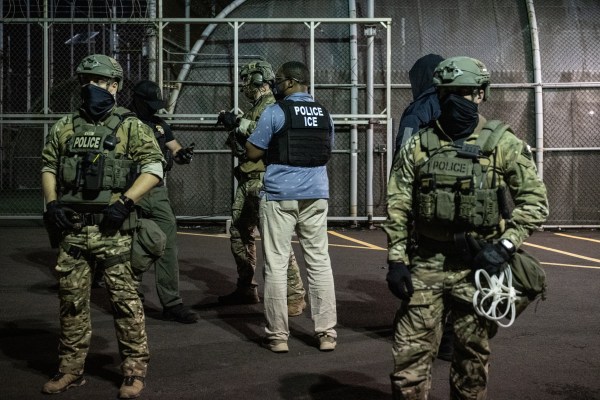You are currently on our free list—meaning this is just a preview of the newsletter. To access the full version and unlock all our reporting, join The Dispatch.
Happy Monday! A summer associate at a Manhattan-based law firm was recently fired for biting off more than she could chew, literally: She allegedly bit several of the firm’s employees, including, most questionably, an HR rep.
Our Dispatch interns only have a few weeks left to get their numbers up.
Quick Hits: Today’s Top Stories
- Russia fired more than 300 drones and 30 missiles at Ukrainian cities early Saturday morning, according to Ukrainian President Volodymyr Zelensky, killing one person and injuring six others—including one child—in the southern port city of Odesa. Meanwhile, Russia’s Defense Ministry said it downed 132 Ukrainian drones overnight Saturday and into Sunday afternoon, including at least 26 above Moscow, causing air travel at Moscow’s four international airports to be temporarily suspended. In a Saturday evening address, Zelensky said he reached out to the Kremlin to discuss a prospective round of ceasefire negotiations for this week. “Everything should be done to achieve a ceasefire,” Zelensky said, adding that Russia “should stop hiding from decisions.”
- The U.S. ambassador to Turkey and special envoy to Syria, Tom Barrack, on Saturday announced that Israel and Syria had reached a U.S.-brokered ceasefire agreement. Israel carried out a series of strikes on Syrian government targets last week, after Damascus deployed forces to a southern Syrian province in an effort to quell clashes between Druze militias and Sunni Bedouin fighters. But Jerusalem accused the Syrian forces, which reportedly intervened in the fighting on behalf of the Bedouins, of targeting Druze civilians and violating a demilitarization policy. The truce took effect Sunday evening local time, Barrack added.
- The Israel Defense Forces (IDF) said its troops fired “warning shots to remove an immediate threat” in northern Gaza on Sunday, following reports from the Hamas-run Gaza Health Ministry that IDF forces killed dozens of Palestinians near an aid site, an estimate which the IDF stated “does not align with the existing information.” The United Nations World Food Program (WFP) said its 25-truck convoy, which was “carrying vital food assistance” from Israel into the Gaza Strip, encountered “large crowds of civilians anxiously waiting to access desperately needed food supplies” near a border crossing before IDF troops opened fire. The WFP has also previously raised the problem of armed gangs looting aid-carrying trucks once they enter the Gaza Strip. Meanwhile, on Friday, Israeli Prime Minister Benjamin Netanyahu called Pope Leo XIV after Gaza’s only Catholic church said an Israeli air strike on its building killed three people and injured 10 others, which Netanyahu’s office in a statement said Israel “deeply regrets,” attributing the fatal mishap to “stray ammunition.”
- Secretary of State Marco Rubio on Friday rescinded U.S. visas for Brazilian Supreme Federal Court Justice Alexandre de Moraes—who is presiding over the prosecution of former Brazilian President Jair Bolsonaro—along with “his allies on the court” and immediate family members. Earlier this month, President Donald Trump threatened to slap a 50 percent tariff on Brazil, effective August 1, if the trial of Bolsonaro—who is accused of plotting a coup to retain power after losing the 2022 presidential election—continues. In a statement on Friday, Rubio described the prosecution of Bolsonaro as a “political witch hunt.” Earlier on Friday, de Moraes ruled that Bolsonaro was a flight risk, requiring him to wear an ankle monitor and further accused the former Brazilian leader of working with his son to court U.S. interference.
- The U.S. on Friday completed a prisoner swap with Venezuela, securing the release of 10 Americans wrongfully detained by Venezuelan dictator Nicolás Maduro’s regime in exchange for more than 250 Venezuelans that the Trump administration ordered deported to El Salvador’s maximum-security prison. El Salvador’s President Nayib Bukele said the agreement, which he noted was first proposed to Maduro in April, also freed Venezuelan political prisoners the Maduro regime had arrested. “It is unacceptable that Venezuelan regime representatives arrested and jailed U.S. nationals under highly questionable circumstances and without proper due process,” Secretary Rubio said in a statement. “Every wrongfully detained American in Venezuela is now free and back in our homeland.”
- Wells Fargo suspended work-related travel to China for all its employees after Chinese authorities prevented Chenyue Mao, a managing director of Wells Fargo’s Atlanta-based branch, from leaving the country, multiple outlets reported on Friday. While Mao was born in Shanghai, she also holds U.S. citizenship. A Wells Fargo spokesperson said the company was “closely tracking this situation and working through the appropriate channels so our employee can return to the United States as soon as possible.” The Washington Post reported Sunday that a Chinese-American man who works for the Commerce Department has been similarly barred from leaving China after visiting family because he did not disclose his work for the U.S. government on his visa application.
- President Trump on Friday sued the Wall Street Journal, its parent company News Corp, and its publisher Dow Jones & Co., seeking damages of at least $10 billion for alleged defamation. One day earlier, the Journal published a story detailing a birthday note Trump allegedly addressed to convicted sexual predator Jeffrey Epstein in 2003, which Trump claimed was fabricated. “We have just filed a POWERHOUSE Lawsuit against everyone involved in publishing the false, malicious, defamatory, FAKE NEWS ‘article,’” Trump wrote on Truth Social, describing it as “historic legal action.” Names listed in the lawsuit as defendants include News Corp owner Rupert Murdoch, News Corp chief executive Robert Thomson, and the two Wall Street Journal reporters who authored the story, Khadeeja Safdar and Joe Palazzolo. In response, a Dow Jones spokesperson emphasized “the rigor and accuracy of our reporting,” adding that the company “will vigorously defend against any lawsuit.”
- Los Angeles police said a driver intentionally drove his car into a crowd waiting in line outside a popular nightclub early Saturday morning, injuring at least 30 people. The 29-year-old suspect, who was removed from that same nightclub earlier that night for being disruptive, was charged on Saturday with attempted murder and assault with a deadly weapon. Bystanders removed the suspect from his vehicle immediately after the incident occurred, and when police arrived, he had sustained a gunshot wound, for which he underwent surgery later that night.
Welcome to ‘Alligator Alcatraz’

Earlier this month, 25-year-old George Retes was arriving for work at a Southern California marijuana farm when federal agents circled his vehicle, broke his window, and sprayed him with tear gas and pepper spray before taking him into custody. Retes, among the more than 360 people to be arrested in the large-scale immigration raid, went on to spend three days in a Los Angeles detention center.
The problem? Retes is a U.S. citizen and Army veteran, and was not charged with breaking any laws. “I want everyone to know what happened. This doesn’t just affect one person,” he told reporters following his release, sharing plans to sue for wrongful detention. “It doesn’t matter if you’re a veteran or you serve this country. They don’t care. They’re just there to fill a quota.”
The high-profile incident wasn’t the first time a U.S. citizen has been swept up in the Trump administration’s immigration crackdown. But it likely contributed to the perception, held by a growing number of Americans, that the White House has overstepped its authority in its effort to carry out sweeping detentions and deportations.
It’s now been six months since President Donald Trump entered office with a promise to remove “the worst of the worst” from American soil. And indeed, arrests by Immigration and Customs Enforcement (ICE) have shot up as illegal border crossings—and, consequently, detentions by Customs and Border Protection—wane. Yet a significant portion of ICE detainees have no criminal record aside from being in the country illegally, with the Trump administration’s sweeping roundups seemingly targeting individuals on a more or less random basis.
Recent public opinion data reveal a significant leftward shift among Americans on immigration, as support for Trump’s heavy-handed approach plummets. In a poll conducted by CBS/YouGov from July 16 to July 18, 44 percent of respondents approved of the administration’s handling of immigration, while 56 percent disapproved. That marked a significant decline from February, when 54 percent of Americans backed the new president’s handling of the issue. “Approval of the deportation program has slipped over these months to become slightly net-negative now, with support becoming more exclusively drawn from Republicans and MAGA identifiers,” CBS News wrote of the results.
The declining support for Trump’s immigration policies comes amid a broader softening on the issue. In the CBS/YouGov poll, 53 percent of participants said the approach of Trump and the Republican Party was “too tough,” while only 18 percent said it was “not tough enough.” And in a July Gallup poll, just 30 percent of respondents said they wanted to see immigration reduced—down from 55 percent last year. A majority of both parties supported allowing undocumented immigrants to become U.S. citizens, with 78 percent overall supporting a pathway to citizenship. A record 79 percent said immigration was good for the country.
In many ways, analysts say, the shifting public opinion on immigration can be seen as an equal and opposite reaction to the president’s increasingly unpopular policies. The sweeping and often botched execution of the long-promised crackdown has generated a storm of headlines and touched individual communities, giving Americans a firsthand look at the practical impact of mass deportations. Instances of racial profiling, excessive force, unwarranted entries, and other alleged abuses perpetrated by federal agents have all raised questions about the latitude officers have to carry out Trump’s agenda. Once in custody, detainees have reported inhumane conditions, including overcrowding, a lack of food, and inadequate medical care.
Some proponents of the administration’s approach argue that such aggressive action is necessary to combat the sclerosis that had built up over decades of lax immigration enforcement. “Those being removed are a mix of criminals and deportation fugitives, on the one hand, and ordinary illegals, on the other,” Mark Krikorian, executive director of the Center for Immigration Studies, recently wrote for The Spectator. “Worksite enforcement is essential to the second track of the strategy: self-deportation. If the only illegals being arrested and deported are criminals, and you, like most illegals, are not a criminal (other than immigration-related crimes), you have little to worry about and so why would you leave?”
But the White House’s sweeping detentions and deportations have also been at the center of many of its ongoing legal battles. In particular, courts have challenged Trump’s ability to invoke the Alien Enemies Act of 1798, a rarely used wartime authority that allows the executive to remove “all natives, citizens, denizens, or subjects” of a country or government at war with the U.S. or engaged in “invasion or predatory incursion,” provided the individuals are not younger than 14 or naturalized citizens. The use of the obscure law, which allows the president to deny foreign nationals due process, is currently being weighed by multiple federal judges.
Yet, on Friday, the Trump administration sent more than 250 Venezuelan deportees held in an El Salvador megaprison—many of whom had been removed under the Alien Enemies Act—to Caracas. In exchange, the administration said, 10 Americans detained in Venezuela would be returned to the United States.
The swap quickly came under scrutiny, both for its reliance on the dubious legal authority and for the precedent it set: At least some of the deported immigrants had fled Venezuela to escape the authoritarian regime of President Nicolás Maduro. “In one way, this deal is actually worse than the usual hostage exchange, where a democratic state sends captured terrorists or other operatives back to a terrorist group like Hamas or an authoritarian regime like Russia,” Ilya Somin, a law professor at George Mason University, wrote in Reason magazine. “Here, the men we are sending back are innocent people who fled an oppressive government, now being forcibly returned to it.”
But as backlash to the White House’s mass deportations grows, the administration is preparing to double down. The Republican tax and spending bill passed by Congress this month allocated $45 billion for immigration detention centers, as well as $30 billion for additional ICE personnel and other operational costs. The windfall made ICE the best-funded law enforcement agency in the federal government, boasting a larger budget than the combined budgets of the Drug Enforcement Administration, the FBI, and the U.S. Marshals Service.
The administration is now seeking to use the funds to significantly expand its detention centers. According to a Saturday report by the Wall Street Journal, ICE plans to expand its capacity to 100,000 beds by the end of the year, up from 40,000 when Trump retook office. In addition to constructing thousands of tents, the report noted, the federal government has pushed Republican governors to open state-run facilities.
One such site—“Alligator Alcatraz”—is already operational in South Florida, constructed on an abandoned airstrip in the Florida Everglades. “There is only one road leading in, and the only way out is a one-way flight,” White House press secretary Karoline Leavitt said of the center, which she described as a “low-cost” way to execute Trump’s mass deportation campaign. “It is isolated and surrounded by dangerous wildlife and unforgiving terrain. The facility will have up to 5,000 beds to house, process, and deport criminal illegal aliens.”
But, despite accepting immigrants for less than a month, the site has already produced its fair share of controversy. Migrants have recounted dangerous conditions in the swampy and remote environment, and, on Wednesday, the American Civil Liberties Union filed a lawsuit claiming detainees were unable to reach their attorneys. In the House of Representatives, Florida Democrats have introduced legislation—the “No Cages in the Everglades Act”—to defund the detention facility, though it’s unlikely to gain traction in the Republican-held lower chamber.
As our colleague Kevin Williamson concluded in his recent piece on the ICE crackdown in Los Angeles, the question of what to do with the more than 11 million illegal immigrants currently in the country is an incredibly thorny one.
Would wages for farm workers and hotel cleaners be higher if there were less immigration overall and fewer illegal workers in the market? Probably. Would prices for food and hotel rooms rise as a result? Probably. Are the people who dislike high levels of immigration on cultural rather than economic grounds racists and xenophobes? Some of them. Are there good-faith, non-economic objections to high levels of immigration and, particularly, to uncontrolled immigration? Of course. And as a matter of practical politics: Would Donald Trump be president of these United States, doing untold damage to our institutions and standing in the world, if Republicans or Democrats had taken a halfway serious approach to the very real issues related to immigration 20 years ago? I don’t think that he would.
How these things get worked out in Los Angeles is probably going to be different from how they get worked out in Greenwich or Detroit or Seattle. I think of Los Angeles a little like I think of Miami, Las Vegas, and New Orleans: I am glad that those cities are there and that they have the respective characters they have, but you don’t want the whole country to be Calle Ocho or the Strip or Bourbon Street. (And, in fact, there is a lot more to those cities than their most famous thoroughfares.) Los Angeles is complicated, home to a lot of tech and media, a lot of eastward- and southward-facing international trade, but also to the nation’s largest and most economically significant garment-manufacturing sector. Los Angeles County, in and of itself, has as much socioeconomic complexity as a good-sized European country, with a population somewhere between those of Austria and Greece. We aren’t going to sort that complexity out by staging Operation Overlord in miniature in the parking lot of Del Taco.
Today’s Must-Read

Not All Change Is Progress
Toeing the Company Line

The Grace of Grief

The Authenticity Flex

The End of Trump’s Epstein Crisis

GENIUS Act Represents a Major Milestone for Crypto Regulation

Layoffs Signal a Makeover at the State Department

Superman and the American Way

The Literature of the Normal

The Wellness Gospel Won’t Save You


Worth Your Time
- Ed Feulner, a longtime former president of the Heritage Foundation, died Friday at age 83. In National Review, Mark Antonio Wright reflected on his contributions to the conservative movement. “In addition to his work in creating the Republican Study Committee in Congress and the Heritage Foundation, which he led as president for parts of five decades, Feulner poured his immense energy into building many of the institutions that have guided the nation,” Wright wrote. “Institutions are the bedrock of our civil society, beginning of course with that most foundational institution: the family. And no small part of the explanation for America’s relative sclerosis in the 21st century is the weakness and decline of so many of the American institutions that rose to prominence and did so much good work during our nation’s first two centuries. Men such as Feulner recognized that we shape our institutions, and then our institutions shape us—and those who come after us. … Not every declining institution can or should be saved. And fights over the heart, soul, and direction of old institutions will be lost. But conservatives shouldn’t hesitate to fight the often long and always hard but very necessary battles to save the organizations that have formed and shaped the nation’s character.”
- The Communist Party of the Russian Federation recently refuted a 1956 address by then-Soviet Union leader Nikita Khrushchev, in which he rejected the idolization of Joseph Stalin. In Project Syndicate, Nina Khrushcheva—a descendant of Khrushchev—detailed how Stalin’s legacy is re-emerging within Russia. “The process of cleaning up Stalin’s image began shortly after Vladimir Putin came to power 25 years ago,” she wrote. “Teaching materials, such as the high-school textbook ‘The Modern History of Russia: 1945-2006,’ justified Stalin’s ‘strong hand’ as necessary to enable a ‘besieged’ country to survive and develop. ‘The formation of a rigid militarized political system’ was a means of ‘solving extraordinary problems in extraordinary circumstances.’” Russia’s invasion of Ukraine amplified this messaging: “The textbooks issued in 2023—a year after Russia’s full-scale invasion of Ukraine—went much further, describing Stalin as a venerable and triumphant figure. (A co-author of the books, Vladimir Medinsky, was also Putin’s lead negotiator in peace talks on Ukraine.) At least 105 of the 120 monuments to Stalin seen across Russia today were erected under Putin’s leadership. The newest addition, located inside Moscow’s Taganskaya subway station, is a white plaster copy of the marble bas-relief that was removed in 1966 as part of the de-Stalinization process.”
Presented Without Comment
President Donald Trump, in a post on Truth Social on Sunday:
My statement on the Washington Redskins has totally blown up, but only in a very positive way. I may put a restriction on them that if they don’t change the name back to the original “Washington Redskins,” and get rid of the ridiculous moniker, “Washington Commanders,” I won’t make a deal for them to build a Stadium in Washington.
…
Cleveland should do the same with the Cleveland Indians. The Owner of the Cleveland Baseball Team, Matt Dolan, who is very political, has lost three Elections in a row because of that ridiculous name change. What he doesn’t understand is that if he changed the name back to the Cleveland Indians, he might actually win an Election. Indians are being treated very unfairly. MAKE INDIANS GREAT AGAIN (MIGA)!
In the Zeitgeist
Robin Williams, the Academy Award-winning actor who starred in widely acclaimed films including Good Will Hunting and Dead Poets Society, would have turned 74 years old today. He brought a variety of characters to life on the big screen, but what made his acting particularly enticing was that no two characters were alike. Peter Pan, former President Teddy Roosevelt, and an elderly English nanny? Williams did it all.
Oh, and he also did voices.
Let Us Know
Who is your favorite Robin Williams character?











Please note that we at The Dispatch hold ourselves, our work, and our commenters to a higher standard than other places on the internet. We welcome comments that foster genuine debate or discussion—including comments critical of us or our work—but responses that include ad hominem attacks on fellow Dispatch members or are intended to stoke fear and anger may be moderated.
With your membership, you only have the ability to comment on The Morning Dispatch articles. Consider upgrading to join the conversation everywhere.